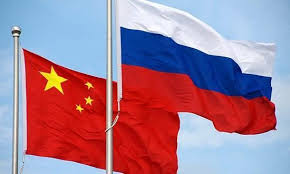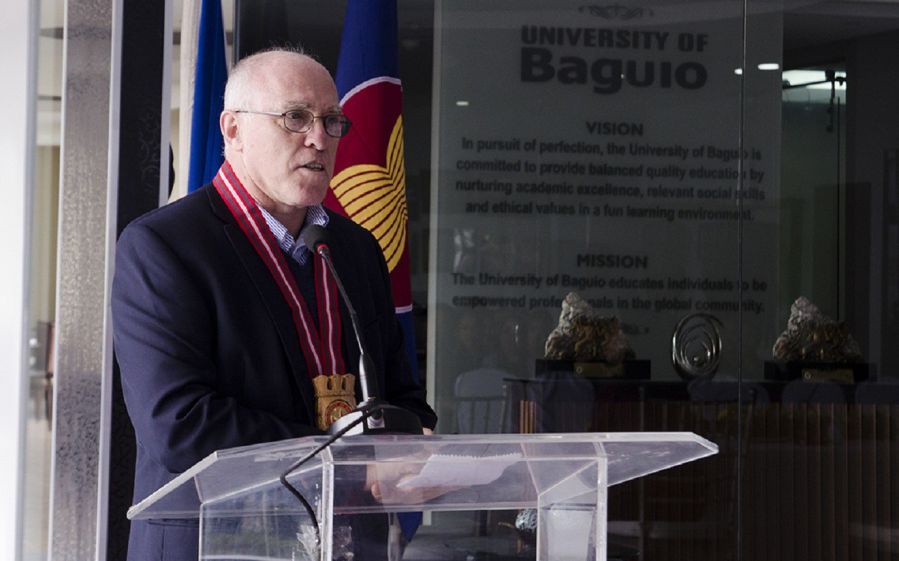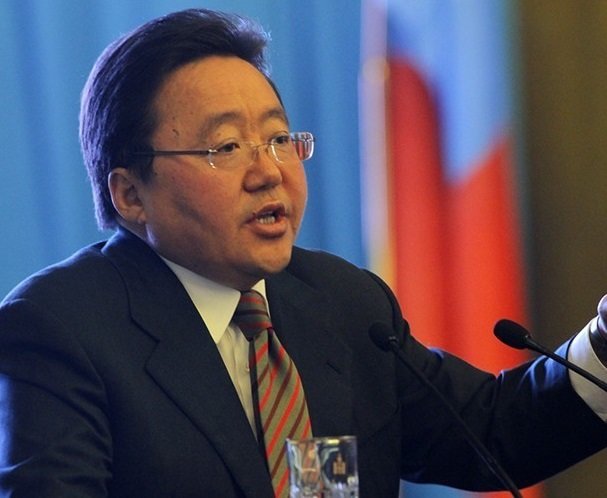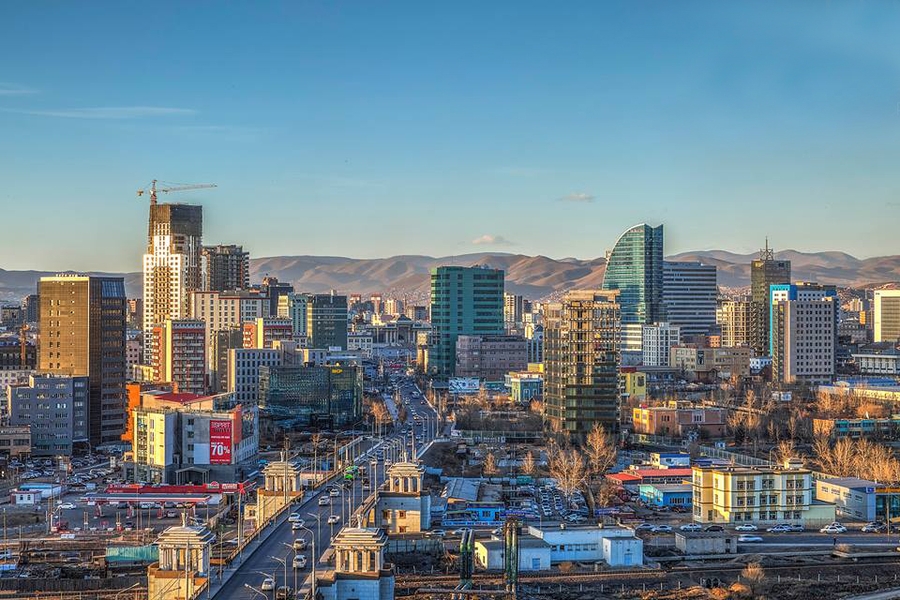Events
| Name | organizer | Where |
|---|---|---|
| MBCC “Doing Business with Mongolia seminar and Christmas Receptiom” Dec 10. 2025 London UK | MBCCI | London UK Goodman LLC |
NEWS

US to delay further tariffs on Chinese goods www.bbc.com
President Donald Trump has announced that the US will delay imposing further trade tariffs on Chinese goods.
The rise in import duties on Chinese goods from 10% to 25% was meant to come into effect on 1 March.
Mr Trump told reporters that the US and China had made "substantial progress" in trade talks over the weekend.
He added that he was planning a summit with Chinese President Xi Jinping in Florida to cement the trade deal if more progress was made.
A report from China's official news agency Xinhua also noted "substantial progress" on specific issues such as technology transfer, intellectual property protection and agriculture.
Mr Trump's decision to delay tariff hikes on $200bn (£153bn) worth of Chinese goods was seen as a sign that the two sides are making progress on settling their damaging trade war.
Stock markets in Asia, which have been sensitive to the dispute, rose on Monday.
Last week, Mr Trump noted progress in the latest round of negotiations in Washington, including an agreement on currency manipulation, though no details were disclosed.
Sources told CNBC on Friday that China had committed to buying up to $1.2tn in US goods, but there had been no progress on the intellectual property issues.
The US accuses China of stealing intellectual property from American firms, forcing them to transfer technology to China.
The trade war between the two countries has disrupted businesses and stoked fears about the impact on the global economy.

China tops list of Russia’s biggest trade partners www.rt.com
Russia’s total trade turnover saw a significant year-over-year growth of 17.5 percent to nearly $688 billion as of the end of 2018, according to data published by the Russian Ministry of Economic Development.
The report showed that exports from Russia totaled some $450 billion, marking a surge of 25.6 percent, while imports saw a modest growth of 4.7 percent to some $238 billion. Share of exports increased to 65.4 percent against 61.1 percent in 2017 while the share of imports declined from 38.9 percent to 34.6 percent.
Below, you can find Russia’s top five key trading partners of 2018.
5. Italy
Trade turnover between Russia and Italy amounted to $27 billion, marking a 12.7 percent growth against the previous year. So far, Russia’s Ministry of Economy has yet to reveal detailed data about the structure of export-and-import ties with Italy.
The latest statistics published by Russia’s web portal of foreign economic information shows that in 2017 mutual trade between the countries totaled $23.94 billion, marking a significant growth against $19.813 billion reached in the previous year.
Russian goods exported to Italy include oil and petrochemicals, iron and nonferrous metals, chemical products, wood, machinery and electrical equipment, vehicles, agricultural and food products, fur and leather goods. Italy reportedly sold machinery and electrical equipment to Russia, as well as chemicals and petrochemicals, clothes, farm and food produce, furniture and bedclothes, shoes, metals and other goods.
4. Belarus
In 2018, Russia’s mutual trade with its western neighbor saw an 11-percent year-on-year increase to $34 billion. The ministry noted that the surge was mostly accounted for by growing exports of energy commodities to Belarus.
According to the Belarusian national statistical portal, the country sold 854,000 tons of coal to neighboring Ukraine. The anthracite exported to Ukraine was reportedly purchased from Russia, as Belarus doesn’t mine coal on its territory.
3. The Netherlands
Russia’s trade turnover with the Netherlands saw a significant surge of more than 19 percent and totaled $47.2 billion. The export growth was reportedly due to increased sales of energy commodities and raw aluminum.
2. Germany
Mutual trade between Russia and Germany amounted to $59.6 billion, marking a surge of 19.3 percent against the previous year. Exports grew by a record 14.6 percent to more than $40 billion, while imports from Germany totaled some $30 billion, marking an increase of only 0.8 percent.
Meanwhile, Russia’s bilateral trade with the European Union totaled $294.2 billion, representing 42.8 percent of the country’s entire turnover. Exports to the bloc reportedly surged 28.3 percent, while imports saw modest growth of 7.7 percent.
1. China
Last year, China managed to become Russia’s number one trading partner, leaving the others far behind. Trade turnover between the neighbors reached $108.3, fixing a record growth of 24.5 percent. Exports of Russian goods reportedly increased by 44 percent and amounted to $56 billion.
The growth occurred mostly in sales of crude oil, refined copper and petrochemicals, according to the Economy Ministry.
...
Ambassador of the United States presents his Letter of Credence www.montsame.mn
Ulaanbaatar/MONTSAME/ The newly-appointed Ambassador Extraordinary and Plenipotentiary of the United States to Mongolia, Mr. Michael Stanley Klecheski, presented his letter of credence to President of Mongolia Khaltmaagiin Battulga on February 22.
In this regard, President Battulga received Ambassador Klecheski and expressed his confidence that the latter will continue the legacy his predecessors had of working consistently and actively during the 30 years of diplomatic relations.
For his part, Ambassador Klecheski remarked that being accredited to Mongolia was an honor, while expressing his commitment to further deepening the strong relations with Mongolia, which is considered to be an oasis of democracy.
President Battulga spoke about the letter he had written to President Donald Trump in which he had addressed the duty free treatment of Mongolian cashmere and other textile products exports to the U.S., which would facilitate increased bilateral trade and employment of women in Mongolia, and how these matters are being put into action today. President Battulga requested the Ambassador’s firm support on the Third Neighbor Trade Act Legislative Bill that was introduced to the Congress.
Moreover, Ambassador Klecheski thanked President Battulga for communicating his views on cooperation in renewable energy, as well as other spheres, and expressed his readiness to work actively on the matters that were discussed and particularly put his efforts into developing bilateral economic relations in which he sees great potential.
source: president.mn

Former President Ts.Elbegdorj questioned by anti-corruption body www.news.mn
Former Mongolian President Ts.Elbegdorj has been questioned by the Independent Authority against Corruption. The meeting took place on 22 February. According to one source, he has given a statement regarding the Tavan Tolgoi coal mining project.
A month ago, Kh.Battulga, President of Mongolia submitted 178 pages of material regarding Tavan Tolgoi to M.Enkh-Amgalan, General Prosecutor.
Ts.Elbegdorj is one of those people who opposes to entering of Mongolia to the Shanghai Cooperation Organisation (SCO). He openly expresses his opposition to public. Ts.Elbegdorj served as fourth Mongolian President from 2009 to 2017.

Mongolia is now in the Top Ten www.news.mn
A discussion entitled ‘Think Bank 2019- Money and the Financial Environment’ was held at the State Palace earlier today (22 February). The event was co-organised by the Parliamentary Economic Standing Committee and the Central Bank of Mongolia.
Mongolia’s economic growth reached 6.9 percent in 2018, making it one of the world’s 10 stable growth countries. The Mongolian government has cleared debts worth MNT 6.5 billion

Commercial banks to include their AQR results in financial reports www.zgm.mn
Parliamentary Standing Committee on Economy and the Bank of Mongolia (BoM) held a public discussion “Think Bank-2019: Financial Environment” last Friday, during which the Governor of BoM announced to address the asset quality review (AQR) of commercial banks.
Opening the discussion, Parliament Speaker Zandanshatar Gombojav remarked, “Legal reform of the banking sector was rather successful in the last two years. As for this year, we are planning on increasing the risk-bearing ability of commercial banks and introducing a re-capitalization system. The key objective of this discussion is to create proper public expectations by regulating false news, the effects of politicization, and improper assumption driven by subjectivism, as well as discussing the opportunities to stabilize and reduce dollarization and improve public trust on MNT.”
He added, “We do not want the Parliament to be a stage for populism or dispute. Therefore, the Law on the Parliamentary Procedures has to be amended to fit the common practices of other countries.”
Later on, the Governor of the BoM Bayartsaikhan Nadmid disclosed that the bank has prepared a plan on the back of the AQR and other reports on commercial banks, which states to include the AQR on bank reports, improve non-performing asset management system, and ensuring the stability of banking sector by adopting a re-capitalization system.
As of today, 44.6 percent of total equity in the banking system accounts for foreign assets and foreign investment in systematically important banks stands at 43.6 percent. Thus, a spokesperson of the University of Finance highlighted the need to address foreign stateowned banks. At the end of the discussion, the organizers prepared a list of issues that need immediate attention. In the external sector, import inflow, foreign debts, interest repayments, dividends, and import service costs remain high. As for real sectors, officials suggested that foreign investment is required in increasing economic diversification, which will help raise public income with less pressure on inflation and boost market competition.
With an aim to promote the BoM policies, activities, economic outlook, and research results, authorities are planning to hold the Think Bank discussion annually.

Reindeer population in Mongolia reaches 2,396 www.xinhuanet.com
ULAN BATOR, Feb. 24 (Xinhua) -- The reindeer population in Mongolia reached 2,396 at the end of 2018, increasing by 167 heads compared to the previous year, the country's National Statistics Office (NSO) said Sunday.
There were more than 2,000 reindeer in Mongolia during the 1970s. However, the number dropped to 926 at the end of 2007, since reindeer herders had to butcher and sell their reindeer due to the lack of sustainable income sources, bringing the animal to the brink of extinction.
According to the NSO, the government of Mongolia has taken measures to improve the herders' living standards by promoting tourism, bringing the number of reindeer back to 2,000 in 2016, since which the reindeer population has been growing continuously.

At least 21 workers killed in Inner Mongolia silver mine accident www.clb.org.hk
At least 21 workers were killed and another 29 injured on Saturday 23 February when a bus transporting them to a lead, zinc and silver mine in Inner Mongolia crashed.
Initial reports said the driver lost control of the vehicle after the brakes failed and ploughed into the side of a tunnel. Photographs and video of the crash scene appear to show an antiquated vehicle with little room for 50 passengers. An investigation by the Beijing News discovered an identical vehicle nearby. The interior had been modified with metal benches on either side and no seat belts. See photo below.
The mine, operated by the Yinman Mining Company in West Ujimqin district, is reportedly the largest silver mine in China, producing around 201 tons of silver annually. Company officials have been placed under travel restrictions while the investigation into the accident is underway, the Ministry of Emergency Management said Sunday.
Transport accidents at mines in China are not uncommon. There were two separate fatal transport accidents at coal mines in the north-western province of Gansu in January this year, while on 21 September last year, four miners died and one was injured in an accident at an Inner Mongolia coal mine.
Following the September accident at an open-cast mine in Inner Mongolia in which a 220-ton transport truck collided with a pickup truck, the National Coal Mine Safety Administration issued an urgent statement calling on all mine operators to learn lessons from the tragedy and “strengthen on-site management…, comprehensively check and control safety risks, promptly investigate and manage hidden dangers.”
The number of mining accidents and deaths in China has steadily decreased over the last two decades. Last year the number of coal mine deaths declined by 13.1 percent to stand at 333, while the total number of accidents fell by 0.9 percent to reach 224 during the same period.
However, there are still numerous examples in which basic safety precautions are ignored or equipment is not properly maintained, leading to serious accidents onsite. The Ministry of Emergency Management needs to focus less on the investigation and punishment of those deemed responsible for accidents and more on ensuring that mine operators really do put the safety of workers above the pursuit of profit.

First AI mining company goes public www.mining.com
Given the massive amounts of data generated by mineral exploration, using artificial intelligence and machine learning to make discoveries seems like a natural fit for the industry.
Goldspot Discoveries, which listed today on the TSX Venture Exchange under the symbol SPOT, takes a big step forward in use of artificial intelligence in the exploration industry. The Montreal-based company is barely three years old, but has secured the backing of some of the biggest names in mining
The Montreal-based company is barely three years old, but has secured the backing of some of the biggest names in mining, including US Global Investors’ Frank Holmes; Eric Sprott, Rob McEwen, mining financiers Triple Flag and Hochschild, and also counts Integra Resources and Yamana Gold as early customers.
Denis Laviolette, founder and president of Goldspot, tells MINING.com that crunching geological data to find new deposits or expand discoveries is just one component of its approach.
Goldspot, which, despite its name is mineral-agnostic, pools what it learns from the geoscience data with capital market information, macro-economic inputs, company specific data and insights into management teams to identify investment targets.
Laviolette says there is enough information in the public domain, especially in places like Canada, for its AI-driven process. The mountains of data interpreted, combined with the expertise of Goldspot's 23-person team, including six Ph.D’s, can then identify the juniors best poised to make discoveries.
The company has $10m in the bank and part of its strategy is to invest in juniors, use its technology to develop exploration targets and acquire royalties. Goldspot has also inked a partnership with Triple Flag to co-invest in these targets.
Goldspot’s incorporation of management data into its decision-making engine is an interesting one. Laviolette says a central consideration when assessing leadership at potential investments is management’s access to capital – a measure of industry respect. But it cuts both ways – some companies may be overvalued because of management’s ability to market themselves and attract capital, beyond what the quality or value of the company’s assets are.

Australia seeks clarification on China coal import 'block' www.bbc.com
The Australian government says it is seeking an "urgent" clarification from Beijing over reports that a major Chinese port has halted imports of Australian coal.
Australia is a top supplier of coal to China, its biggest export market.
Beijing has not confirmed the reported halt in the port of Dalian, but called changes in such arrangements "normal".
Canberra sought to play down speculation on Friday that the matter may be linked to bilateral tensions.
Australian officials said there was "confusion" over the situation, and they were consulting their Chinese counterparts.
"I wouldn't jump to conclusions. The Australia-China trading relationship is exceptionally strong," Treasurer Josh Frydenberg told the Australian Broadcasting Corporation.
Fears about the issue have prompted a fall in the Australian dollar.
What has happened?
On Thursday, Reuters reported that China's Dalian port region would not allow Australian coal to pass through customs.
The news agency quoted officials as saying that only Australian coal had been affected, with no limits placed on Indonesian and Russian shipments.
It said other Chinese ports had delayed Australian coal shipments in recent months.
Australian trade officials said they had been notified of recent industry concerns about market access.
When asked about the reported halt, Chinese Foreign Ministry spokesman Geng Shuang offered general comments that authorities sought "to safeguard the rights and interests of Chinese importers and protect the environment".
What else is being debated?
Some security analysts in Australia have suggested it could be a tit-for-tat move by China, after Australia blocked tech giant Huawei from providing 5G technology.
"The banning of those coal shipments is a form of coercion against Australia. It's punishment against states that resist China's pressure," said Dr Malcolm Davis, from the Australian Strategic Policy Institute.
Other recent tensions have emerged over allegations - denied by Beijing - of Chinese interference in Australian politics and society.
However others, including the head of the Reserve Bank of Australia, have suggested that China's concerns about its own coal industry may be behind any such halts.
Blocking "a couple of months of coal exports" would not hurt the Australian economy, said Philip Lowe.
"If it were to be the sign of a deterioration in the underlying political relationship between Australia and China then that would be more concerning," he said.
Mr Frydenberg said: "We can see these occasional interruptions to the smooth flow but that doesn't necessarily translate to some of the consequences that aspects of the media might seek to leap to."
- «
- 1
- 2
- 3
- 4
- 5
- 6
- 7
- 8
- 9
- 10
- 11
- 12
- 13
- 14
- 15
- 16
- 17
- 18
- 19
- 20
- 21
- 22
- 23
- 24
- 25
- 26
- 27
- 28
- 29
- 30
- 31
- 32
- 33
- 34
- 35
- 36
- 37
- 38
- 39
- 40
- 41
- 42
- 43
- 44
- 45
- 46
- 47
- 48
- 49
- 50
- 51
- 52
- 53
- 54
- 55
- 56
- 57
- 58
- 59
- 60
- 61
- 62
- 63
- 64
- 65
- 66
- 67
- 68
- 69
- 70
- 71
- 72
- 73
- 74
- 75
- 76
- 77
- 78
- 79
- 80
- 81
- 82
- 83
- 84
- 85
- 86
- 87
- 88
- 89
- 90
- 91
- 92
- 93
- 94
- 95
- 96
- 97
- 98
- 99
- 100
- 101
- 102
- 103
- 104
- 105
- 106
- 107
- 108
- 109
- 110
- 111
- 112
- 113
- 114
- 115
- 116
- 117
- 118
- 119
- 120
- 121
- 122
- 123
- 124
- 125
- 126
- 127
- 128
- 129
- 130
- 131
- 132
- 133
- 134
- 135
- 136
- 137
- 138
- 139
- 140
- 141
- 142
- 143
- 144
- 145
- 146
- 147
- 148
- 149
- 150
- 151
- 152
- 153
- 154
- 155
- 156
- 157
- 158
- 159
- 160
- 161
- 162
- 163
- 164
- 165
- 166
- 167
- 168
- 169
- 170
- 171
- 172
- 173
- 174
- 175
- 176
- 177
- 178
- 179
- 180
- 181
- 182
- 183
- 184
- 185
- 186
- 187
- 188
- 189
- 190
- 191
- 192
- 193
- 194
- 195
- 196
- 197
- 198
- 199
- 200
- 201
- 202
- 203
- 204
- 205
- 206
- 207
- 208
- 209
- 210
- 211
- 212
- 213
- 214
- 215
- 216
- 217
- 218
- 219
- 220
- 221
- 222
- 223
- 224
- 225
- 226
- 227
- 228
- 229
- 230
- 231
- 232
- 233
- 234
- 235
- 236
- 237
- 238
- 239
- 240
- 241
- 242
- 243
- 244
- 245
- 246
- 247
- 248
- 249
- 250
- 251
- 252
- 253
- 254
- 255
- 256
- 257
- 258
- 259
- 260
- 261
- 262
- 263
- 264
- 265
- 266
- 267
- 268
- 269
- 270
- 271
- 272
- 273
- 274
- 275
- 276
- 277
- 278
- 279
- 280
- 281
- 282
- 283
- 284
- 285
- 286
- 287
- 288
- 289
- 290
- 291
- 292
- 293
- 294
- 295
- 296
- 297
- 298
- 299
- 300
- 301
- 302
- 303
- 304
- 305
- 306
- 307
- 308
- 309
- 310
- 311
- 312
- 313
- 314
- 315
- 316
- 317
- 318
- 319
- 320
- 321
- 322
- 323
- 324
- 325
- 326
- 327
- 328
- 329
- 330
- 331
- 332
- 333
- 334
- 335
- 336
- 337
- 338
- 339
- 340
- 341
- 342
- 343
- 344
- 345
- 346
- 347
- 348
- 349
- 350
- 351
- 352
- 353
- 354
- 355
- 356
- 357
- 358
- 359
- 360
- 361
- 362
- 363
- 364
- 365
- 366
- 367
- 368
- 369
- 370
- 371
- 372
- 373
- 374
- 375
- 376
- 377
- 378
- 379
- 380
- 381
- 382
- 383
- 384
- 385
- 386
- 387
- 388
- 389
- 390
- 391
- 392
- 393
- 394
- 395
- 396
- 397
- 398
- 399
- 400
- 401
- 402
- 403
- 404
- 405
- 406
- 407
- 408
- 409
- 410
- 411
- 412
- 413
- 414
- 415
- 416
- 417
- 418
- 419
- 420
- 421
- 422
- 423
- 424
- 425
- 426
- 427
- 428
- 429
- 430
- 431
- 432
- 433
- 434
- 435
- 436
- 437
- 438
- 439
- 440
- 441
- 442
- 443
- 444
- 445
- 446
- 447
- 448
- 449
- 450
- 451
- 452
- 453
- 454
- 455
- 456
- 457
- 458
- 459
- 460
- 461
- 462
- 463
- 464
- 465
- 466
- 467
- 468
- 469
- 470
- 471
- 472
- 473
- 474
- 475
- 476
- 477
- 478
- 479
- 480
- 481
- 482
- 483
- 484
- 485
- 486
- 487
- 488
- 489
- 490
- 491
- 492
- 493
- 494
- 495
- 496
- 497
- 498
- 499
- 500
- 501
- 502
- 503
- 504
- 505
- 506
- 507
- 508
- 509
- 510
- 511
- 512
- 513
- 514
- 515
- 516
- 517
- 518
- 519
- 520
- 521
- 522
- 523
- 524
- 525
- 526
- 527
- 528
- 529
- 530
- 531
- 532
- 533
- 534
- 535
- 536
- 537
- 538
- 539
- 540
- 541
- 542
- 543
- 544
- 545
- 546
- 547
- 548
- 549
- 550
- 551
- 552
- 553
- 554
- 555
- 556
- 557
- 558
- 559
- 560
- 561
- 562
- 563
- 564
- 565
- 566
- 567
- 568
- 569
- 570
- 571
- 572
- 573
- 574
- 575
- 576
- 577
- 578
- 579
- 580
- 581
- 582
- 583
- 584
- 585
- 586
- 587
- 588
- 589
- 590
- 591
- 592
- 593
- 594
- 595
- 596
- 597
- 598
- 599
- 600
- 601
- 602
- 603
- 604
- 605
- 606
- 607
- 608
- 609
- 610
- 611
- 612
- 613
- 614
- 615
- 616
- 617
- 618
- 619
- 620
- 621
- 622
- 623
- 624
- 625
- 626
- 627
- 628
- 629
- 630
- 631
- 632
- 633
- 634
- 635
- 636
- 637
- 638
- 639
- 640
- 641
- 642
- 643
- 644
- 645
- 646
- 647
- 648
- 649
- 650
- 651
- 652
- 653
- 654
- 655
- 656
- 657
- 658
- 659
- 660
- 661
- 662
- 663
- 664
- 665
- 666
- 667
- 668
- 669
- 670
- 671
- 672
- 673
- 674
- 675
- 676
- 677
- 678
- 679
- 680
- 681
- 682
- 683
- 684
- 685
- 686
- 687
- 688
- 689
- 690
- 691
- 692
- 693
- 694
- 695
- 696
- 697
- 698
- 699
- 700
- 701
- 702
- 703
- 704
- 705
- 706
- 707
- 708
- 709
- 710
- 711
- 712
- 713
- 714
- 715
- 716
- 717
- 718
- 719
- 720
- 721
- 722
- 723
- 724
- 725
- 726
- 727
- 728
- 729
- 730
- 731
- 732
- 733
- 734
- 735
- 736
- 737
- 738
- 739
- 740
- 741
- 742
- 743
- 744
- 745
- 746
- 747
- 748
- 749
- 750
- 751
- 752
- 753
- 754
- 755
- 756
- 757
- 758
- 759
- 760
- 761
- 762
- 763
- 764
- 765
- 766
- 767
- 768
- 769
- 770
- 771
- 772
- 773
- 774
- 775
- 776
- 777
- 778
- 779
- 780
- 781
- 782
- 783
- 784
- 785
- 786
- 787
- 788
- 789
- 790
- 791
- 792
- 793
- 794
- 795
- 796
- 797
- 798
- 799
- 800
- 801
- 802
- 803
- 804
- 805
- 806
- 807
- 808
- 809
- 810
- 811
- 812
- 813
- 814
- 815
- 816
- 817
- 818
- 819
- 820
- 821
- 822
- 823
- 824
- 825
- 826
- 827
- 828
- 829
- 830
- 831
- 832
- 833
- 834
- 835
- 836
- 837
- 838
- 839
- 840
- 841
- 842
- 843
- 844
- 845
- 846
- 847
- 848
- 849
- 850
- 851
- 852
- 853
- 854
- 855
- 856
- 857
- 858
- 859
- 860
- 861
- 862
- 863
- 864
- 865
- 866
- 867
- 868
- 869
- 870
- 871
- 872
- 873
- 874
- 875
- 876
- 877
- 878
- 879
- 880
- 881
- 882
- 883
- 884
- 885
- 886
- 887
- 888
- 889
- 890
- 891
- 892
- 893
- 894
- 895
- 896
- 897
- 898
- 899
- 900
- 901
- 902
- 903
- 904
- 905
- 906
- 907
- 908
- 909
- 910
- 911
- 912
- 913
- 914
- 915
- 916
- 917
- 918
- 919
- 920
- 921
- 922
- 923
- 924
- 925
- 926
- 927
- 928
- 929
- 930
- 931
- 932
- 933
- 934
- 935
- 936
- 937
- 938
- 939
- 940
- 941
- 942
- 943
- 944
- 945
- 946
- 947
- 948
- 949
- 950
- 951
- 952
- 953
- 954
- 955
- 956
- 957
- 958
- 959
- 960
- 961
- 962
- 963
- 964
- 965
- 966
- 967
- 968
- 969
- 970
- 971
- 972
- 973
- 974
- 975
- 976
- 977
- 978
- 979
- 980
- 981
- 982
- 983
- 984
- 985
- 986
- 987
- 988
- 989
- 990
- 991
- 992
- 993
- 994
- 995
- 996
- 997
- 998
- 999
- 1000
- 1001
- 1002
- 1003
- 1004
- 1005
- 1006
- 1007
- 1008
- 1009
- 1010
- 1011
- 1012
- 1013
- 1014
- 1015
- 1016
- 1017
- 1018
- 1019
- 1020
- 1021
- 1022
- 1023
- 1024
- 1025
- 1026
- 1027
- 1028
- 1029
- 1030
- 1031
- 1032
- 1033
- 1034
- 1035
- 1036
- 1037
- 1038
- 1039
- 1040
- 1041
- 1042
- 1043
- 1044
- 1045
- 1046
- 1047
- 1048
- 1049
- 1050
- 1051
- 1052
- 1053
- 1054
- 1055
- 1056
- 1057
- 1058
- 1059
- 1060
- 1061
- 1062
- 1063
- 1064
- 1065
- 1066
- 1067
- 1068
- 1069
- 1070
- 1071
- 1072
- 1073
- 1074
- 1075
- 1076
- 1077
- 1078
- 1079
- 1080
- 1081
- 1082
- 1083
- 1084
- 1085
- 1086
- 1087
- 1088
- 1089
- 1090
- 1091
- 1092
- 1093
- 1094
- 1095
- 1096
- 1097
- 1098
- 1099
- 1100
- 1101
- 1102
- 1103
- 1104
- 1105
- 1106
- 1107
- 1108
- 1109
- 1110
- 1111
- 1112
- 1113
- 1114
- 1115
- 1116
- 1117
- 1118
- 1119
- 1120
- 1121
- 1122
- 1123
- 1124
- 1125
- 1126
- 1127
- 1128
- 1129
- 1130
- 1131
- 1132
- 1133
- 1134
- 1135
- 1136
- 1137
- 1138
- 1139
- 1140
- 1141
- 1142
- 1143
- 1144
- 1145
- 1146
- 1147
- 1148
- 1149
- 1150
- 1151
- 1152
- 1153
- 1154
- 1155
- 1156
- 1157
- 1158
- 1159
- 1160
- 1161
- 1162
- 1163
- 1164
- 1165
- 1166
- 1167
- 1168
- 1169
- 1170
- 1171
- 1172
- 1173
- 1174
- 1175
- 1176
- 1177
- 1178
- 1179
- 1180
- 1181
- 1182
- 1183
- 1184
- 1185
- 1186
- 1187
- 1188
- 1189
- 1190
- 1191
- 1192
- 1193
- 1194
- 1195
- 1196
- 1197
- 1198
- 1199
- 1200
- 1201
- 1202
- 1203
- 1204
- 1205
- 1206
- 1207
- 1208
- 1209
- 1210
- 1211
- 1212
- 1213
- 1214
- 1215
- 1216
- 1217
- 1218
- 1219
- 1220
- 1221
- 1222
- 1223
- 1224
- 1225
- 1226
- 1227
- 1228
- 1229
- 1230
- 1231
- 1232
- 1233
- 1234
- 1235
- 1236
- 1237
- 1238
- 1239
- 1240
- 1241
- 1242
- 1243
- 1244
- 1245
- 1246
- 1247
- 1248
- 1249
- 1250
- 1251
- 1252
- 1253
- 1254
- 1255
- 1256
- 1257
- 1258
- 1259
- 1260
- 1261
- 1262
- 1263
- 1264
- 1265
- 1266
- 1267
- 1268
- 1269
- 1270
- 1271
- 1272
- 1273
- 1274
- 1275
- 1276
- 1277
- 1278
- 1279
- 1280
- 1281
- 1282
- 1283
- 1284
- 1285
- 1286
- 1287
- 1288
- 1289
- 1290
- 1291
- 1292
- 1293
- 1294
- 1295
- 1296
- 1297
- 1298
- 1299
- 1300
- 1301
- 1302
- 1303
- 1304
- 1305
- 1306
- 1307
- 1308
- 1309
- 1310
- 1311
- 1312
- 1313
- 1314
- 1315
- 1316
- 1317
- 1318
- 1319
- 1320
- 1321
- 1322
- 1323
- 1324
- 1325
- 1326
- 1327
- 1328
- 1329
- 1330
- 1331
- 1332
- 1333
- 1334
- 1335
- 1336
- 1337
- 1338
- 1339
- 1340
- 1341
- 1342
- 1343
- 1344
- 1345
- 1346
- 1347
- 1348
- 1349
- 1350
- 1351
- 1352
- 1353
- 1354
- 1355
- 1356
- 1357
- 1358
- 1359
- 1360
- 1361
- 1362
- 1363
- 1364
- 1365
- 1366
- 1367
- 1368
- 1369
- 1370
- 1371
- 1372
- 1373
- 1374
- 1375
- 1376
- 1377
- 1378
- 1379
- 1380
- 1381
- 1382
- 1383
- 1384
- 1385
- 1386
- 1387
- 1388
- 1389
- 1390
- 1391
- 1392
- 1393
- 1394
- 1395
- 1396
- 1397
- 1398
- 1399
- 1400
- 1401
- 1402
- 1403
- 1404
- 1405
- 1406
- 1407
- 1408
- 1409
- 1410
- 1411
- 1412
- 1413
- 1414
- 1415
- 1416
- 1417
- 1418
- 1419
- 1420
- 1421
- 1422
- 1423
- 1424
- 1425
- 1426
- 1427
- 1428
- 1429
- 1430
- 1431
- 1432
- 1433
- 1434
- 1435
- 1436
- 1437
- 1438
- 1439
- 1440
- 1441
- 1442
- 1443
- 1444
- 1445
- 1446
- 1447
- 1448
- 1449
- 1450
- 1451
- 1452
- 1453
- 1454
- 1455
- 1456
- 1457
- 1458
- 1459
- 1460
- 1461
- 1462
- 1463
- 1464
- 1465
- 1466
- 1467
- 1468
- 1469
- 1470
- 1471
- 1472
- 1473
- 1474
- 1475
- 1476
- 1477
- 1478
- 1479
- 1480
- 1481
- 1482
- 1483
- 1484
- 1485
- 1486
- 1487
- 1488
- 1489
- 1490
- 1491
- 1492
- 1493
- 1494
- 1495
- 1496
- 1497
- 1498
- 1499
- 1500
- 1501
- 1502
- 1503
- 1504
- 1505
- 1506
- 1507
- 1508
- 1509
- 1510
- 1511
- 1512
- 1513
- 1514
- 1515
- 1516
- 1517
- 1518
- 1519
- 1520
- 1521
- 1522
- 1523
- 1524
- 1525
- 1526
- 1527
- 1528
- 1529
- 1530
- 1531
- 1532
- 1533
- 1534
- 1535
- 1536
- 1537
- 1538
- 1539
- 1540
- 1541
- 1542
- 1543
- 1544
- 1545
- 1546
- 1547
- 1548
- 1549
- 1550
- 1551
- 1552
- 1553
- 1554
- 1555
- 1556
- 1557
- 1558
- 1559
- 1560
- 1561
- 1562
- 1563
- 1564
- 1565
- 1566
- 1567
- 1568
- 1569
- 1570
- 1571
- 1572
- 1573
- 1574
- 1575
- 1576
- 1577
- 1578
- 1579
- 1580
- 1581
- 1582
- 1583
- 1584
- 1585
- 1586
- 1587
- 1588
- 1589
- 1590
- 1591
- 1592
- 1593
- 1594
- 1595
- 1596
- 1597
- 1598
- 1599
- 1600
- 1601
- 1602
- 1603
- 1604
- 1605
- 1606
- 1607
- 1608
- 1609
- 1610
- 1611
- 1612
- 1613
- 1614
- 1615
- 1616
- 1617
- 1618
- 1619
- 1620
- 1621
- 1622
- 1623
- 1624
- 1625
- 1626
- 1627
- 1628
- 1629
- 1630
- 1631
- 1632
- 1633
- 1634
- 1635
- 1636
- 1637
- 1638
- 1639
- 1640
- 1641
- 1642
- 1643
- 1644
- 1645
- 1646
- 1647
- 1648
- 1649
- 1650
- 1651
- 1652
- 1653
- 1654
- 1655
- 1656
- 1657
- 1658
- 1659
- 1660
- 1661
- 1662
- 1663
- 1664
- 1665
- 1666
- 1667
- 1668
- 1669
- 1670
- 1671
- 1672
- 1673
- 1674
- 1675
- 1676
- 1677
- 1678
- 1679
- 1680
- 1681
- 1682
- 1683
- 1684
- 1685
- 1686
- 1687
- 1688
- 1689
- 1690
- 1691
- 1692
- 1693
- 1694
- 1695
- 1696
- 1697
- 1698
- 1699
- 1700
- 1701
- 1702
- 1703
- 1704
- 1705
- 1706
- 1707
- 1708
- 1709
- 1710
- 1711
- 1712
- 1713
- 1714
- »






